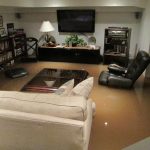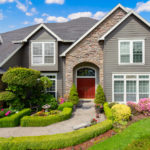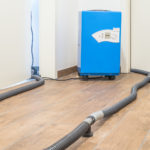Water damage can occur anywhere at any time, but you may be surprised that many floods and excessive damage are caused by the same source. This blog will discuss the most common causes of water damage, how to prevent it, and the professionals to call to have it cleaned up.
The most common causes of water damage include the following:
- Leaking or Burst Pipes
- Plumbing problems
- Areas with high moisture content (crawlspace, attics, and basements)
- Broken appliances (refrigerators, hot water heaters, washing machines, dishwashers, etc.)
- HVAC units
- Rainstorms and flash floods
1. Frozen and Burst Pipes
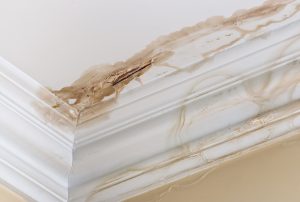
Especially in the winter, burst pipes are the most common cause of water damage. But for the most part, any pipe that is left to freeze in extremely low temperatures will burst due to the water pressure pushing against the inside of the pipe.
In the case of leaking pipes, garbage disposals, drains, and toilets that are backed up, they can also add excessive pressure to the pipe. The leak can start small, but grow larger if left untreated for any amount of time. As soon as you have noticed the leak, ensure to repair it right away and call for water damage restoration to have the area restored.
How to Prevent Frozen and Burst Pipes
Prevent pipes from freezing. To prevent your pipes from freezing, you will want to keep the pipes – especially those in hidden areas like behind the walls and in the attic and basement – at room temperature.
Prevent pipes from bursting. To prevent pipes from bursting, you will want to thaw them out using space heaters or heat lamps. But never take a blow torch to the pipe as it may ruin the pipe, even causing it to burst due to the amount of strain from the fire.
2. Plumbing Problems
While some plumbing problems will be easier to fix than others, those that are located behind the walls can be particularly hard to notice in their beginning stages. It is often that the homeowner will not notice the issue until the area behind the wall is flooded and leaking through the drywall.
In addition, many plumbing problems are the result of poorly attached hoses and pipe joints. To prevent this problem, have your pipes inspected or if you feel confident, you can inspect them yourself to make sure that all pipes are attached and in good condition.
How to Prevent Plumbing Problems
As soon as you notice any pipes that are leaking, you can repair them yourself or hire a licensed plumber. You can also have an annual inspection to examine the condition of all pipes on the property; just be sure to have them repaired or replaced when needed.
3. Areas with High Moisture
While storage areas like the attic, crawlspace, and basement can provide a number of benefits for the house itself, they are known to hold profound amounts of moisture. This happens due to the lack of ventilation in these tight areas, trapping moisture in small, dark spaces.
In the attic, this can also spring roof leaks, eventually leading to mold and rotting if not treated in its early stages. Make sure to call a professional roofing contractor to have it repaired as well as having the source of moisture removed.
How to Prevent Water Damage from High Moisture Areas
You can prevent water damage in the crawlspace, attic, basement and other areas with high moisture by increasing the air circulation throughout the home. With high-humidity seasons, consider setting up a dehumidifier in each of these areas, eliminating the excess moisture before it spurs water damage and mold.
It is also a good idea to frequently inspect these areas, making sure that they stay dry. Listen for drips, look for loose pipes, and consider measuring the moisture level in each area.
4. Broken Appliances
Depending on their age, appliances may start to break down, developing rust and cracks that will eventually spring leaks. Common appliances include the following:
- Washing Machines
- Refrigerators
- Dishwashers
- Water heaters
However, the appliances that are known to cause the most damage are water heaters and washing machines.
How to Prevent Water Damage from Broken Appliances
To prevent water damage from appliances, make sure that each of them are in good working condition, especially the hot water heater and washing machine. If any spring a leaks, don’t use them again until they have been fixed.
If any are old, it will be well worth it to replace it than to continue repairs and risking another leak that can lead to additional water damage.
5. HVAC Units
HVAC units are one of the largest assets in the home, connected to the air ducts, air conditioning, and heating units. But it’s the A/C units in particular that need servicing. If not, moisture will accumulate within the machine and develop water damage and even mold growth. If you do find mold, be sure to contact a mold removal specialist before the spores are distributed throughout the air ducts and into your home.
How to Prevent Water Damage from HVAC Units
At least once every season, make sure that the air conditioning unit is clean, dry, and free of mold. Especially during the summer time when it is used the most, consider inspecting and cleaning it once each week. This can also prevent it from breaking down.
6. Rainstorms and Floods
While the spring season is the worse time for this type of water damage, it can happen at anytime, even with snow and ice damming. Of course, there’s nothing you can do to prevent mother nature from doing her job, but there are prevention measures you can take to limit the damage.
Otherwise, flash floods and rainstorms can result in flooded basements, consuming drywall and carpeting. This issue will require immediate flood extraction in addition to drying out all affected building materials and contents.
How to Prevent Water Damage from Floods and Rainstorms
There are a number of ways to prevent your home from flooding. Be sure to do all of the following:
- Make sure your sump pump is in proper working condition
- Seal all cracks in your foundation
- Consider buying flood insurance
- Keep your gutters and downspouts free of debris
- Angle your yard away from your home
What to Do After Sustaining Water Damage
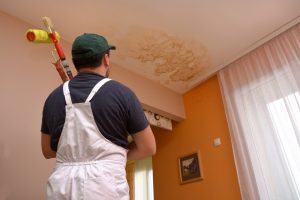
If your home has already suffered water damage, either by one of the causes listed above or something else, don’t hesitate to call a professional restoration company. If left alone, the damage will continue to spread to other building materials, resulting in more time and costs to repair the property.
When searching for a local provider, check out your local ServiceMaster. When it comes to emergency services, their professionals are available 24/7, trained, and licensed to make the repairs needed to return your property to its original condition. They use professional dehumidification and air-moving equipment to completely dry out the building materials, remove soiled debris, and sanitize the area.
Finally, ServiceMaster can also work with your insurance company during the claims process, providing details of the services performed to ensure accurate results.
